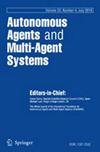ASN: action semantics network for multiagent reinforcement learning
Abstract
In multiagent systems (MASs), each agent makes individual decisions but all contribute globally to the system’s evolution. Learning in MASs is difficult since each agent’s selection of actions must take place in the presence of other co-learning agents. Moreover, the environmental stochasticity and uncertainties increase exponentially with the number of agents. Previous works borrow various multiagent coordination mechanisms for use in deep learning architectures to facilitate multiagent coordination. However, none of them explicitly consider that different actions can have different influence on other agents, which we call the action semantics. In this paper, we propose a novel network architecture, named Action Semantics Network (ASN), that explicitly represents such action semantics between agents. ASN characterizes different actions’ influence on other agents using neural networks based on the action semantics between them. ASN can be easily combined with existing deep reinforcement learning (DRL) algorithms to boost their performance. Experimental results on StarCraft II micromanagement and Neural MMO show that ASN significantly improves the performance of state-of-the-art DRL approaches, compared with several other network architectures. We also successfully deploy ASN to a popular online MMORPG game called Justice Online, which indicates a promising future for ASN to be applied in even more complex scenarios.


 求助内容:
求助内容: 应助结果提醒方式:
应助结果提醒方式:


